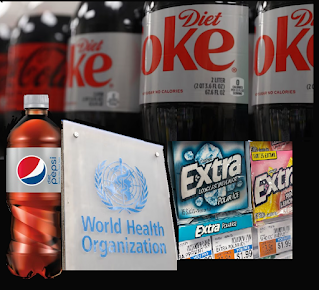Aspartame, a widely used artificial sweetener found in various food and beverage products, is about to face a significant challenge. The World Health Organization's (WHO) cancer research arm, the International Agency for Research on Cancer (IARC), is set to declare aspartame as a "possible carcinogen." This decision, based on a thorough examination of existing evidence, will undoubtedly spark debates and raise concerns among consumers and the food industry alike. In this blog post, we delve into the topic, addressing common questions such as the presence of aspartame in popular sodas like Diet Pepsi, the alleged link between Diet Coke and cancer, and the role of sweeteners like Sweet'N Low. Let's explore the complex world of artificial sweeteners and their potential health implications.
What is Aspartame?
Aspartame is a low-calorie artificial sweetener that is approximately 200 times sweeter than sugar. It is commonly used as a sugar substitute in various food and beverage products. Marketed under trade names such as NutraSweet, Equal, and Canderel, aspartame is a methyl ester of the aspartic acid/phenylalanine dipeptide.
WHO Cancer Research Agency: Aspartame as a Possible Carcinogen
According to reliable sources, the IARC, the cancer research arm of WHO, is expected to list aspartame as a "possibly carcinogenic to humans" substance next month. This ruling, which considers the available evidence, aims to determine the potential hazard of a substance rather than establish safe consumption levels. The IARC's decision will not be the final verdict, as it is essential to consider additional factors such as the advice from WHO's expert committee on food additives and national regulators.
Does Diet Pepsi Have Aspartame?
For those wondering about the presence of aspartame in Diet Pepsi, the answer is yes. Diet Pepsi has been formulated with aspartame since the early 1980s when it gained approval as a food additive. While regulatory agencies worldwide, including the FDA, have deemed aspartame safe for consumption, concerns have been raised regarding potential health issues like headaches, seizures, and certain cancers. However, the evidence remains inconclusive, and major health organizations generally consider aspartame an acceptable sugar substitute. Individuals who prefer to avoid aspartame should carefully read labels or explore alternatives to diet soda. Diet Pepsi Have Aspartame? Yes.
Does Diet Coke Cause Cancer?
The association between Diet Coke and cancer has sparked concern among consumers. Studies have suggested a possible link between aspartame, an ingredient in Diet Coke, and certain types of cancers, including lymphomas, leukemias, and brain cancer. However, it is crucial to note that most of these studies have limitations and cannot definitively establish a cause-and-effect relationship. Large-scale reviews and meta-analyses have failed to find clear evidence indicating that aspartame increases the overall risk of cancer. According to the American Cancer Society, current evidence suggests that aspartame is unlikely to cause cancer in humans.
Sweet'N Low: A Different Sweetening Agent
Is Sweet and Low Aspartame? Sweet N Low, a brand of tabletop sweetener, mainly contains saccharin and not aspartame. Saccharin is an artificial sweetener approximately 300-400 times sweeter than sugar. While both saccharin and aspartame have faced controversy in the past, major health organizations have deemed them safe when consumed in approved doses. It is important to recognize that saccharin and aspartame possess distinct chemical structures and properties.
In conclusion, the potential classification of aspartame as a possible carcinogen by the IARC has sparked concerns and debates about the safety of artificial sweeteners. While the scientific community continues to examine the relationship between aspartame and cancer, it is important to acknowledge that the evidence remains inconclusive. Regulatory agencies worldwide have deemed aspartame safe for consumption, but individuals with specific health objectives or concerns may choose to limit or avoid its use as a precautionary measure. As the discussion evolves, more research, including long-term and large-scale trials, will shed light on the true nature of the relationship between aspartame and cancer risk.
The news of aspartame potentially being classified as a possible carcinogen by the IARC poses a significant challenge for most dieters who rely on artificial sweeteners to reduce calorie intake. This development restricts choices and disrupts the carefully planned diets of many individuals.
Many people trying to lose weight turn to artificial sweeteners as a way to reduce calories while still enjoying sweet foods and beverages. Aspartame remains one of the most commonly used artificial sweeteners, found in diet soda, sugar-free gum and other reduced-calorie products. The news of aspartame potentially being classified as a possible carcinogen by the IARC poses a significant challenge for most dieters who rely on artificial sweeteners to reduce calorie intake. This development restricts choices and disrupts the carefully planned diets of many individuals. Overall choices in diet and food selection have the greatest impact on health and weight loss outcomes for individuals.
Sources:
https://www.reuters.com/business/healthcare-pharmaceuticals/whos-cancer-research-agency-say-aspartame-sweetener-possible-carcinogen-sources-2023-06-29/
https://www.independent.co.uk/news/health/aspartame-diet-coke-sweetener-cancer-who-b2367030.html
https://fortune.com/well/2023/06/29/world-health-organization-aspartame-possible-carcinogen/



Comments
Post a Comment